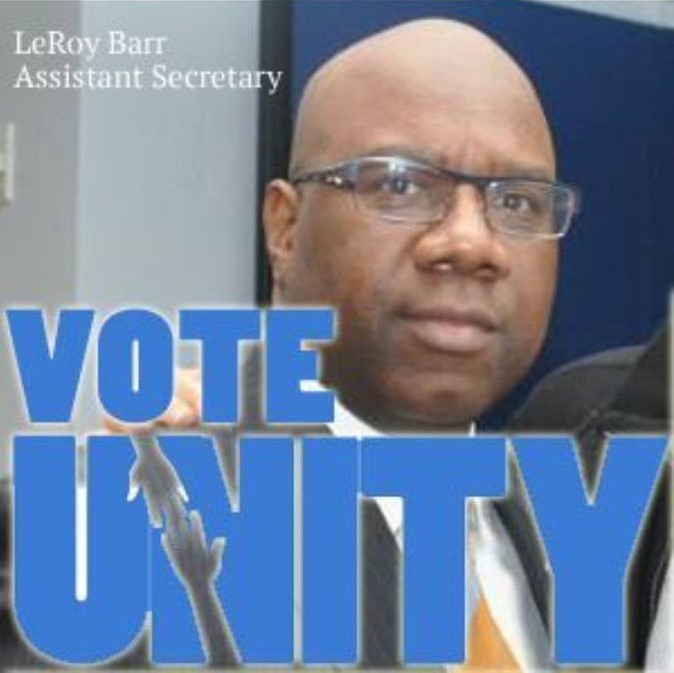 In its January meeting, after a pro-forma discussion, the Delegate Assembly of the UFT (United Federation of Teachers), which still has the legal right to bargain collectively on behalf of New York City's teachers, voted down a resolution to work with community groups to support Black Lives Matter in the schools in February. LeRoy Barr, UFT's assistant secretary, co-staff director, and Chairperson of the Unity Caucus, gave the UFT leadership's rationale for rejecting the motion. Support for BLM was, he contended, a splinter issue, divisive, at a time when the union had to stay focused on what was key, the Janus decision and the threat to collective bargaining rights.
In its January meeting, after a pro-forma discussion, the Delegate Assembly of the UFT (United Federation of Teachers), which still has the legal right to bargain collectively on behalf of New York City's teachers, voted down a resolution to work with community groups to support Black Lives Matter in the schools in February. LeRoy Barr, UFT's assistant secretary, co-staff director, and Chairperson of the Unity Caucus, gave the UFT leadership's rationale for rejecting the motion. Support for BLM was, he contended, a splinter issue, divisive, at a time when the union had to stay focused on what was key, the Janus decision and the threat to collective bargaining rights.
UFT President, Michael Mulgrew, opened the Delegate Assembly warning teachers about the threat of the Janus decision, which may decimate membership of public employee unions. Mulgrew and the Unity Caucus, which controls the UFT apparatus, explain Janus threatens the union’s mission, “standing together and taking care of each other.” However, what they mean by “stand together” — as workers, teachers, public employees, union members — is what’s called “business unionism,” the conception that has brought us to this precipice, paving the way to Janus.
In his remarks, Barr referenced (inaccurately) how the UFT and Albert Shanker had navigated the divisions of the Vietnam War. A better analogy is AFT’s long-time refusal to support the rights of gay teachers for forty years until the issue was made “safe” by activists, many of them teachers acting as individuals. They changed the minds, hearts, and laws of this country, without their union’s support or encouragement. They did it by taking to the streets, educating people about their right to be equal in all regards, then pushing for laws that advanced the struggle.
I pursued this privately with AFT President Randi Weingarten after a panel in which she and I appeared at New York University, because Weingarten had used the recent legal victories about gay marriage as an example of how we could win on controversial issues — if we backed off of confrontation. Was the AFT right to refuse to support gay teachers' rights in the 1970s, when we had first raised it, I asked? The AFT's argument was that the issue was unpopular, divisive, and would distract from the union's core purpose — protecting teachers. “I wasn’t around then,” she hedged, annoyed. I pressed her, asking if, in retrospect, the union's decision had been morally and politically right, if she would defend it now. She said “No.” Had those of us who pushed the AFT to take a stand been correct? "Yes," she said, even more frustrated at the turn of conversation.
LeRoy Barr erred about supporting Black Lives Matter protests using same reasoning that places the AFT and the UFT on the wrong side of every social justice struggle that challenges inequalities embedded in capitalism — until the cause is made respectable by activists. To take strong positions on social justice issues, the union needs its members' loyalty and trust. To do that it has to fight, hard, for its members’ economic interests. As the summary of the business taken up by January Delegate Assembly shows, that doesn't happen. Unwilling and/or unable to defend teachers’ dignity on the job, the union leadership is afraid to alienate teachers who don’t see that systemic racism is a union concern, especially in a school system that is majority "minority."
Teachers are human and are not immune to toxic social prejudices and bigotry. In response, unions often assume the irreversibility of members’ current beliefs, adopting what seem pragmatic policies. In reality these seemingly “practical” policies undercut possibilities of successful resistance by alienating our potential allies and demoralizing the most politically conscious union members. Barr's position and the DA's vote to support it makes building support for union struggles that affect kids' lives in classrooms harder. Their position weakens the union at the moment teachers and public employees most need to build trust in communities of color.
Randi Weingarten admits that the AFT was wrong to delay its support for gay rights. LeRoy Barr should acknowledge that he and the UFT are repeating that mistake. The time is now, Brother Barr.


Leave a Reply